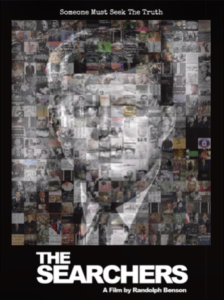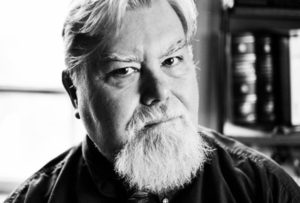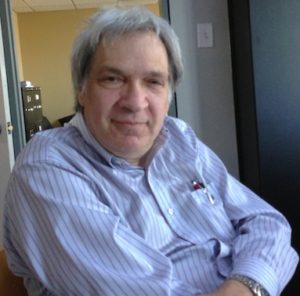
As John Judge recites lines from Bob Dylan’s “All Along the Watchtower” in a manner so Shakespearean that it makes rock music’s greatest poet’s original rendering seem pedestrian, Adam Tenenbaum’s music softly plays beneath a montage of JFK assassination researchers at work. These are The Searchers.
Producer, Editor, Writer, and Director Randolph Benson is not a novice in the field of documentary. He has been an instructor of film and video at the Center for Documentary Studies at Duke University for over a decade. In this film, Benson has created an ode, an epic, and a lament in the span of 94 brilliantly crafted minutes.
The film highlights JFK assassination researchers Josiah Thompson, John Judge, Mark Lane, Dr. Cyril Wecht, Robert Groden, Walt Brown, Debra Conway, Jim DiEugenio, Jim Marrs, Lisa Pease, Dr. Gary Aguilar, Rex Bradford (Mary Ferrell), Andy Winiarczyk, Vincent Salandria, Sylvia Meagher, Harold Weisberg, Mae Brussell, and Penn Jones, Jr.
Benson understands, wisely, that the importance of JFK research extends beyond writers as he highlights Conway’s conference and publishing work at JFK Lancer, Bradford’s work at the Mary Ferrell Foundation, and the monumental importance of Winiarczyk’s bookstore, The Last Hurrah. While a majority of the Searchers have produced and continue to produce works that change the state of research today, many others have made valuable contributions in their own fields of expertise.
Absent here (but thanked in the credits) is Len Osanic’s Black Op Radio program. As this publishes, Osanic has produced 843 episodes, most concerning the JFK assassination. It is the best spotlight the researcher has in 2017. The archives alone may be the second most important JFK assassination archive (next to the Mary Ferrell Foundation’s collection).
The contemporary importance of each researcher should not be underestimated. Most still appear at conferences, as well as appearing on the talk shows and podcasts that attempt to bring research to the masses in this new millennium. To paraphrase the president from whence this research originates, this is a new generation of Americans (and beyond). Reaching them is vital, and despite what some may call topic-fatigue, many of the living researchers still appear, speak, and correspond. Often they do so for nothing other than the satisfaction and hope that the mustard seeds sown into a new generation will become a range of conjoined mountains. And isn’t that just what President Kennedy would have wanted?

Early in the film, Judge describes his passion for the field. “Other people would rather be doing other things,” Judge says. “I wouldn’t… I like to read, I like to research… I like to look into things.” Judge was 15-years-old on November 22, 1963. Benson further humanizes each researcher by filming them within their own environments – the cities, pubs, offices, clinics, and lairs that make the researchers most comfortable.
These are not the tin-foil hats looking for a better explanation to an unthinkable tragedy, as the mainstream media would like the public to believe. They are forensic pathologists, high school teachers, ophthalmologists, attorneys, publishers, and moms. These are men and women who all began with the research – many with the Warren Report’s own words – and whose seeds were planted across America at various times. Hearing their personal stories is simultaneously satisfying and exhilarating.
When the topic briefly turns to the mainstream media, as it does throughout John Barbour’s new documentary, The American Media & the Second Assassination of President John F. Kennedy, JFK assassination legend Groden pulls no punches.

“The Warren Report was backed by CBS News on the day of the assassination,” Groden forcefully states as he describes the irregularities and impossibilities of CBS running an informed two-hour assassination special on the day the report was released. Groden then labels The Nation’s Max Holland as “the official writer for the CIA on the Kennedy assassination.”
The researchers shown on screen largely agree with the idea that we may never know the details regarding what happened on November 22nd, 1963, who perpetrated the murder, and why it was done. Judge is the lone dissenter shown in the film. He states directly that we could know the answers to those questions someday. The questions are empirical, Judge states. They, therefore, have answers.
Whether we, the truth seekers, will “win” is another question. “That’s the job of every generation,” Judge said. “Even if we don’t think we’ll win, we must try.”
Judge’s definitive “must” is the challenge to a new generation of Searchers. They may not all be authors, but neither were the Searchers v1.0. This generation will have short film makers, Facebook posters, YouTube content creators, podcasters, bloggers, and digital photojournalists.
Will they be a family in the sense that Walt Brown believes the original researchers of the first fifty years have been a family? Many current researchers question whether or not this community is a family at all. There has been contention between the dueling conferences in Dallas (though, it appears, not between the speakers themselves) and it seems like the alt-history communities can often eat their young rather than mentoring them.
Brown disagrees. “That day [November 22, 1963] holds us together like family,” Brown said. “We may do what families do. But at the end of the day, we’re all family.”
As Judge, whose likeability and smile bursts through the screen, quotes his final Dylan line at the 94-minute mark, the screen fades to black. Those who did not know beforehand then learn that the affable passion of John Judge left us in 2014. Benson’s film is a tribute to Judge and the many researchers who have left us before, as well as those who still fight today.
It’s interesting that Benson’s work debuts widely in the same month as Barbour’s. These are two fascinating, emotional, heartfelt works from men that have been brought to the case through different means and remain in it for different reasons. However, along with Nigel Turner’s multi-part The Men Who Killed Kennedy, broadcast from 1988-2003, Benson and Barbour may have produced the new millennium’s best documentaries on the subject.
Randolph Benson has created a film that every single truth seeker, journalism student, and history major should see. Benson’s brilliance has also made The Searchers accessible enough to inspire the average American who doesn’t own Mark Lane’s Rush to Judgment or Oliver Stone’s JFK. It’s a thank you as well as a call to arms from the Searchers themselves.
Though Tenenbaum’s music may seem overly somber, it could be interpreted as respectful and reflective. Watching Randolph Benson’s The Searchers is like meeting your heroes except, unlike the old adage, they are all unbelievably likeable. Walt Brown was correct. For everyone who has attended a conference, listened to a podcast, bought a book, or corresponded with one of these men and women, it feels as if you are watching the progressive genealogy of a family.
Judge chose Dylan, but as I ended my second viewing of The Searchers, I kept hearing the words of F. Scott Fitzgerald running through my heart as I also contemplated what my role – my obligation -would be in the community.
“So we beat on, boats against the current, borne back ceaselessly into the past.”